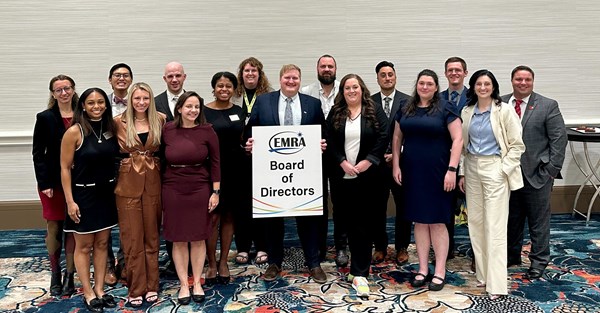EMRA isn't just an organization — it's your organization. Your voice, your experiences, and your ideas matter. Have you ever thought, “There has to be a better way”? Bring that idea to EMRA. We are far from powerless when we stand together.
Monitors beep, a patient calls out, “Nurse!” with a rasp.
It’s 3:47 a.m.
Three more hours of my shift, but my body feels like it stopped working hours ago; it’s my first night shift in a string, and I didn’t nap beforehand. I try to focus on writing notes — GSW to the chest that went directly to the OR, flash pulmonary edema that’s now comfortable on BiPAP, low-risk chest pain that’s now (hopefully) safe at home. I realize I’m referring to patients by their disease and chief complaints, something I swore I wouldn’t do when I started residency. I check my phone and see a text from my college friends group chat—"Dave, when can we catch up? It’s been forever!" I close my eyes and sigh; they’re all vacationing in Costa Rica, but I’ll be lucky if I make it to one of their weddings in 3 months.
Welcome to emergency medicine training: rewarding, and relentless.
Residency is designed to challenge us so that, as attendings, we don’t need to rise to challenges, but instead can fall to the level of our training. Long hours, unpredictable schedules, and the emotional toll of caring for people on the worst day of their lives sets us up for burnout. Yet we thrive in chaos, find purpose in crisis, and rise every day to serve. I want to reflect on the struggle of burnout, offer hope for balance, and show how meaningful change lies not in isolation, but in uniting as a community.
Burnout isn’t just a buzzword in EM — it’s a lived reality. I remember a particularly grueling week: long shifts, patients with unrealistic expectations, grumpy consultants, conference on my only day off. I feel lucky because my program allows plenty of autonomy and I find value in the work I do, but driving home after that last shift, I caught myself dwelling on frustrations and overlooking the human side of medicine. That scared me. I love this field — the fast pace, the problem-solving, the impact — but in trying to be a good doctor I was losing sight of what brought me to it in the first place.
I know I’m not alone in this. Burnout in EM is among the highest in all specialties. It’s not just physical exhaustion; it’s the emotional toll of giving without refueling. The quiet guilt of missing family milestones, friendships fading, self-care relegated to a mythical “later.”
Yet I see resilience in all of us, a shared understanding that drives us to keep showing up for our patients and each other. But resilience alone isn’t enough. If we keep pushing forward without addressing the causes of burnout, we risk losing not only our well-being but also the joy and passion that brought us to EM in the first place.
One lesson I’ve learned in residency is that we are never truly alone. It might feel that way at 3 a.m. on a chaotic shift, but step back, and you’ll see the community we belong to. Emergency medicine is a family—a tribe of people who understand the unique challenges of what we do.
This is where organizations like EMRA become essential. From mentorship and wellness initiatives to advocacy efforts, EMRA connects us, supports us, and gives us meaningful representation. When I’ve felt overwhelmed, my involvement with EMRA has rekindled my sense of purpose. EMRA reminds me I’m part of something bigger than myself — a movement to not just survive training, but to ensure EM remains the best specialty.
To effectively address burnout, we must address the systemic challenges causing it. This requires a unified voice and collective action. EMRA is perfectly positioned to lead that charge. Through EMRA, we have the power to advocate for what we need, not just as individuals, but as a community. We can push for policies that protect trainees, engage with leadership to improve working conditions, and create a future where EM thrives.
Here’s where you come in. Do you have solutions for combating burnout, improving wellness, or advocating for trainees? Enact those ideas through EMRA. Working together, we can turn frustration into action and dreams into tangible change.
As trainees, it’s easy to feel powerless. But I promise you, we are far from powerless when we stand together. United, we can create a specialty where the passion that brought us here is matched by a system that supports us.
Emergency medicine is more than a career; it’s a calling. But for us to answer that call — in training and for decades to come — we must care for ourselves and each other. We must invest in our own well-being as fiercely as we invest in our patients. And we must unite to build a future where EM is sustainable, fulfilling, and resilient.
So, I ask you: What do you need? What changes do you want to see? Tell us. EMRA is here, ready to act. Let's be the generation who transforms emergency medicine.



